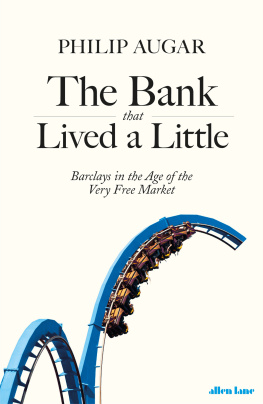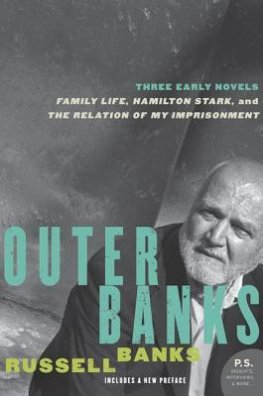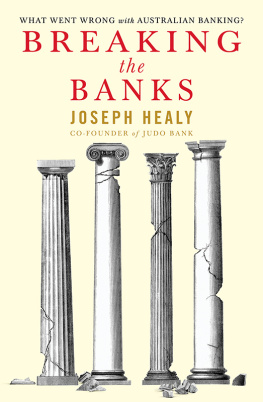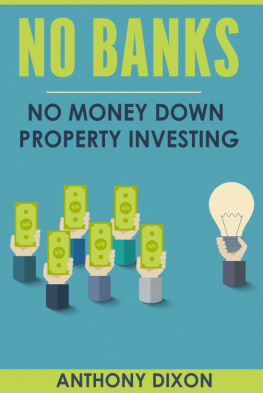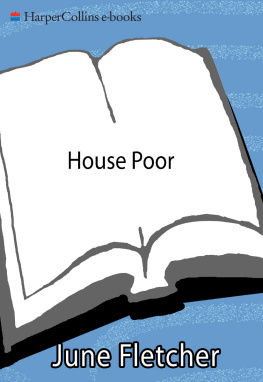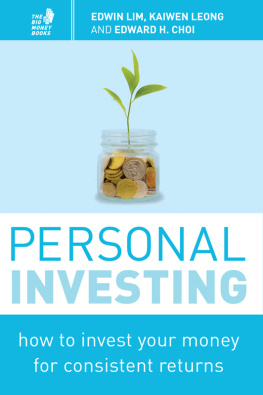PENGUIN BOOKS
THE GREED MERCHANTS
Philip Augar worked in investment banking for over twenty years. He led NatWests global equity and bond business before becoming a Group Managing Director at Schroders. He was a member of the team that negotiated the sale of Schroders investment bank to Citigroup in 2000 before becoming a full-time writer. His first book, The Death of Gentlemanly Capitalism: The Rise and Fall of Londons Investment Banks, was published in 2000 and was a business bestseller. His co-authored second book, The Rise of the Player Manager, was published by Penguin in 2002 and was one of Amazon UKs Business Books of the Year. Philip Augar speaks and broadcasts on business and management issues and has written for many publications including the Financial Times and other broadsheets. He can be contacted through his website, www.philipaugar.com .
PHILIP AUGAR
The Greed Merchants
How the Investment Banks Played the Free Market Game

PENGUIN BOOKS
PENGUIN BOOKS
Published by the Penguin Group
Penguin Books Ltd, 80 Strand, London WC2R 0RL, England
Penguin Group (USA) Inc., 375 Hudson Street, New York, New York 10014, USA
Penguin Group (Canada), 90 Eglinton Avenue East, Suite 700, Toronto, Ontario, Canada M4P 2Y3
(a division of Pearson Penguin Canada Inc.)
Penguin Ireland, 25 St Stephens Green, Dublin 2, Ireland
(a division of Penguin Books Ltd)
Penguin Group (Australia), 250 Camberwell Road, Camberwell, Victoria 3124, Australia
(a division of Pearson Australia Group Pty Ltd)
Penguin Books India Pvt Ltd, 11 Community Centre, Panchsheel Park, New Delhi 110 017, India
Penguin Group (NZ), cnr Airborne and Rosedale Roads, Albany, Auckland 1310, New Zealand
(a division of Pearson New Zealand Ltd)
Penguin Books (South Africa) (Pty) Ltd, 24 Sturdee Avenue, Rosebank, Johannesburg 2196, South Africa
Penguin Books Ltd, Registered Offices: 80 Strand, London WC2R 0RL, England
www.penguin.com
First published by Allen Lane 2005
Published in Penguin Books 2006
1
Copyright Philip Augar, 2005
All rights reserved
The moral right of the author has been asserted
Except in the United States of America, this book is sold subject
to the condition that it shall not, by way of trade or otherwise, be lent,
re-sold, hired out, or otherwise circulated without the publishers
prior consent in any form of binding or cover other than that in
which it is published and without a similar condition including this
condition being imposed on the subsequent purchaser
EISBN: 9780141900629
To the three that I admire most
I have never adhered to the view that Wall Street is uniquely evil, just as I have never found it possible to accept with complete confidence the alternative view, rather more palatable in sound financial circles, that it is uniquely wise.
J. K. Galbraith
Contents
Acknowledgements
This book originated in a paper I delivered at a seminar organized by the London School of Economics Financial Markets Group in September 2001. I am grateful to Sir Geoffrey Owen and John Plender for inviting me to speak there, thus getting the ball rolling.
I have carried out a large number of interviews with investment bankers and brokers, their corporate and institutional customers and their regulators in the United States and Britain. Many of these people are still involved with the financial services industry and in most cases I have protected their identity. I should like to thank them all, whether named or not, for being so generous with their time. I also wish to acknowledge the Securities Industry Association for giving me permission to quote from and use their research publications and data.
Several experts on the financial services industry read the draft manuscript. Without exception their input improved its accuracy and clarity. Their comments, together with those of my editors, Stuart Proffitt in London and Adrian Zackheim in New York, have been invaluable. I should also like to thank successive classes of students at Cranfield University who listened to the developing argument during my lectures and shaped it through intelligent and stimulating questions. I am also appreciative of the help given by Adrian Fitz-Gerald and Stephen Sale.
Most of all, however, I am grateful to my immediate family, Denise, William and Rachel. They provided me with support and tolerance when I became grumpy when the writing got tough, they helped with the research and production of the book and they have always been willing to act as a sounding board for ideas and text. I love you all.
Foreword to the paperback edition
Investment banking has moved at its usual hectic pace in the year since the manuscript for the hardback edition of this book was completed. New products, people and protocols have emerged and they are doubtless evolving further as I write. One thing that has not changed, however, is the importance of the investment banks integrated business model. Conflict of interest albeit better regulated and managed now remain inherent in the model. Integration also continues to give powerful investment banks a decisive advantage over other market users. With this in mind, I have resisted the temptation to have a second bite at the cherry. What follows is the original text, updated only for the most significant events and with certain passages moved from the present to the past tense to reflect the passage of time.
Philip Augar
Cambridge, England, 2006
Preface
This book completes a journey that started in 1978 when I took my first job. I worked for over twenty years as an investment analyst, head of research and chief executive with two British securities firms. My work took me round the world. I made frequent visits to Wall Street, reviewing the firms American subsidiaries and meeting clients. My final task as a full time investment banker was to help my employer, Schroders, sell its investment bank to Citigroup in 2000.
It was a good time to leave. I had become increasingly doubtful about the industry I was in and its role in the economy. During my time, the profession appeared to have moved from putting the client first to putting itself first. We exerted enormous pressure on clients to transact. We helped to raise and recycle lots of capital, yet we employees seemed to benefit more than our clients and shareholders. We never seemed to face up to the truth about what we were really doing.
To start with I thought this was a London problem. My first book, The Death of Gentlemanly Capitalism, described how the City of Londons investment banks and brokers had lost out to foreign, mainly American, competitors in the years after Big Bang in 1986. I expected that this book would end my interest in finance, but I kept a weather eye on investment banking. Some firms used me as a consultant; others asked my opinion informally; friends in the business kept me in touch with what was happening.
It was hard to ignore: the media was full of the most extraordinary goings-on: the boom and bust of the dot-com bubble, corporate scandal in recession-hit America and lay-offs on Wall Street and in the City. To cap it all, the exposure of uncontrolled conflict of interest at the heart of investment banking came not from the regulators who were meant to be in charge of the investment banks but in the unlikely form of the New York State Attorney General, Eliot Spitzer.
For a year, 2002, Wall Street was on its knees. Then new rules, promises to be more vigilant and rising markets eased the pressure. The investment banking industry regained its equilibrium and the whole episode came to be seen as an unwelcome but inevitable consequence of the 1990s bubble. The consensus appeared to be that Wall Street had received its rap on the knuckles and that capitalism could once again move fairly and squarely forward.
Next page

